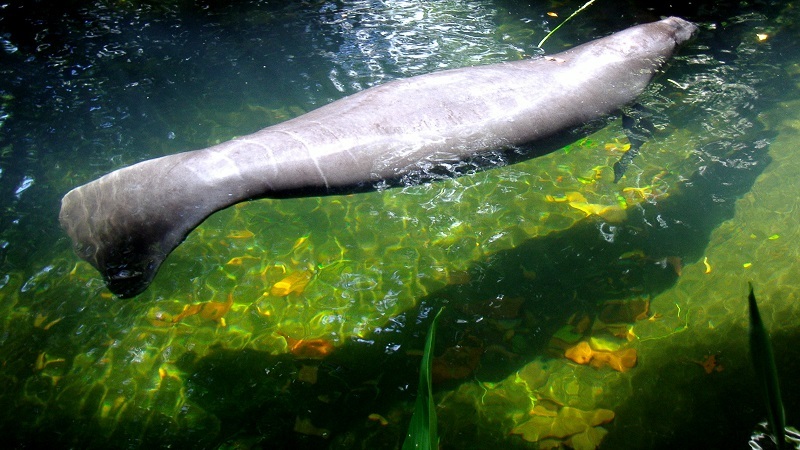Save the Manatee Club Executive Director Patrick Rose | youtube.com/watch?v=iLniHQHTAkQ
The U.S. Environmental Protection Agency (EPA) has until mid-February to do a better job protecting manatees from water pollution in Florida to avoid a lawsuit threat issued by conservation groups.
The EPA has 60 days from the formal notice filed to the agency by three conservation groups on Dec. 20, to reinitiate consultation with Fish and Wildlife Service (FWS) "in light of significant new information" about pollution in Florida's estuaries. The notice referred to the more than 1,000 manatees that have died so far this year in Florida, an "unusual mortality event," that the notice linked directly to pollution-fueled seagrass die-offs, particularly in the Indian River Lagoon, that has led to mass manatee starvation.

A manatee swimming in Florida waters
| FreeImages - salame
The formal notice was issued by the Center for Biological Diversity, Defenders of Wildlife and Save the Manatee Club and is the environmental conservation group's intent to sue the EPA over the agency "failing to protect manatees from water pollution in Florida," according to an announcement by Earthjustice on the filing.
The lawsuit threat is against the EPA, but Florida is more directly responsible for the mass starvation die off, Elizabeth Forsyth, an attorney for Earthjustice, said in the announcement on the organization's website.
"It is painfully clear that Florida isn't doing what's necessary to control the sewage and fertilizer pollution that’s wrecking our public waters," Forsyth said in the announcement. "It's time for EPA to step in and enforce the Clean Water Act for the sake of the manatees and all the other creatures — and people — that rely on Florida's waterways. If watching manatees starve isn't the tipping point for the EPA to step in, I don't know what is."
Manatees are starving because "thousands of acres" of seagrass in Florida's Indian River Lagoon are being killed by toxic algae blooms created by high levels of nutrient pollution in the Florida waterway, according to Earthjustice. The seagrass die-off highlights "the inadequacy of the state's federally approved water-quality standards," the organization states in the notice.
Among other things, the conservation groups are requiring the EPA work with FWS to re-evaluate pollution standards, saying that "manatee experts" predict that manatees will continue to be malnourished and starved this winter, despite recently announced plans by FWS and Florida Fish and Wildlife Conservation Commission officials to provide supplemental feeding.
Save the Manatee Club applauded the supplemental feeding earlier this month. The club's Executive Director Patrick Rose said the feeding "will be a significant move to help prevent another severe loss of manatees due to starvation that occurred last winter."
Save the Manatee Club reports 677 dead manatees were found along Florida's east coast between December 2020 and this past May, the highest number ever recorded in the state over any six-month period. By Nov. 19, a total of 1,017 dead manatees were recovered, "an all-time record," the club reports.
The latest reported number of manatee deaths is more than double the average annual death rate over five years, represents 19% of the Atlantic population of Florida manatees and 12% of all manatees in Florida, according to the formal notice.
Supplemental feeding would not be a solution to the problem of starving manatees, conservation experts say. Instead, the supplemental feedings would take pressure off rescue and rehabilitation efforts, Martine deWit, the veterinarian who runs FWC's St. Petersburg-based necropsy lab, said to Florida Today in October.
"This would be a massive effort, even when the provisioning happens on a smaller scale," deWit said to FT. "What we all agree about is that this would definitely not be a long-term solution that habitat restoration is, and obviously efforts addressing that are more important than anything (and happening). These are unprecedented times for sure."
Earlier in December, Florida Fish and Wildlife Conservation Commission (FFWC) announced it would be working with the federal FWS and Florida Power & Light, on programs to address the manatee die-off, including a short-term feeding trial. Florida Power & Light, the state’s largest electric utility, is spending $700,000 on a "temporary field response station" to feed manatees at the utility's plant in Cape Canaveral. The station also would rescue and rehabilitate "distressed manatees," according to the announcement.





